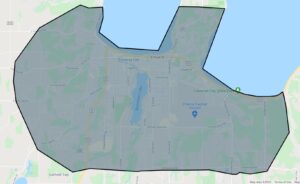Lessons from the BATA Link On-Demand Pilot, Traverse City, MI
20 minutes Date Launched/Enacted: Aug 1, 2020 Date Published: August 4, 2021
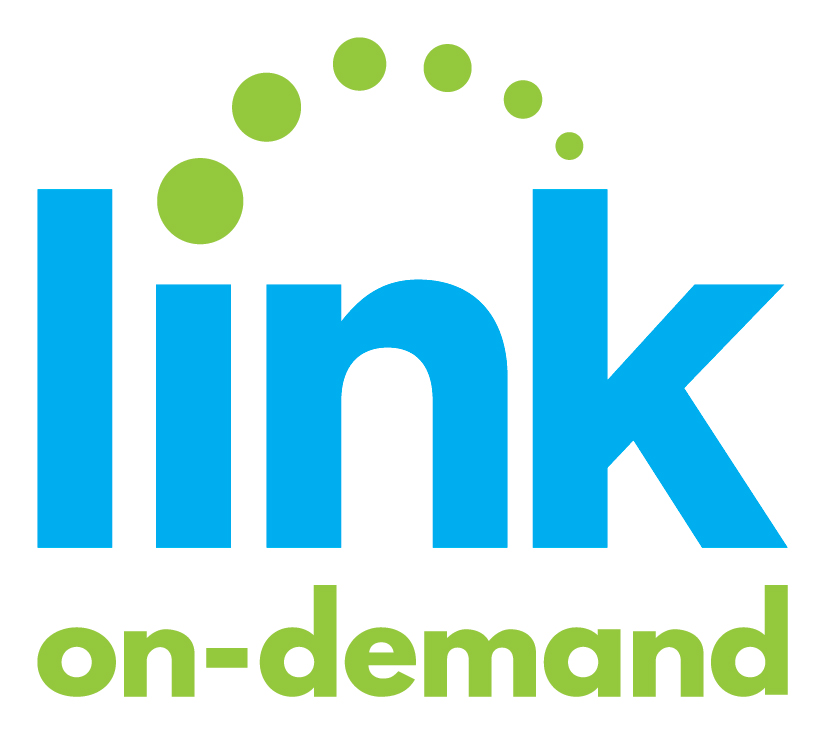
Brief Summary
-
- BATA transitioned its dial-a-ride service, City Link, into a mobility on-demand service called Link On-Demand. With Link On-Demand, customers can request shared point-to-point rides in real-time.
- BATA supported the Link On-Demand pilot with an Integrated Mobility Innovation grant from the Federal Transit Administration.
- BATA used a separate grant from the Grand Traverse Regional Foundation and the Michigan Health Endowment Fund to give customers fare-free rides to and from medical appointments through Link On-Demand. BATA has discontinued this non-emergency medical transportation component and is exploring how to make this type of service feasible in the future.
- BATA partnered with TransLoc as the booking and routing technology vendor for the Link On-Demand pilot. By transitioning the agency’s dial-a-ride service into a mobility on-demand service, BATA realized they could better serve their customers more efficiently.

This pilot project is part of the Mobility Innovation Collaborative (MIC) program. The MIC program provides a comprehensive suite of technical assistance resources, promotes knowledge sharing activities, and captures stories and lessons learned from nearly 50 innovative mobility projects across the United States.
Originally published August 2021, revised February 2026.
Introduction
New technologies can help transit agencies adapt their services to more efficiently serve customers. That is what the Bay Area Transportation Authority (BATA) in Traverse City, Michigan realized when it began piloting Link On-Demand, a mobility on-demand (MOD) and non-emergency medical transportation (NEMT) service. Before transitioning into the Link On-Demand pilot, BATA operated a dial-a-ride program, called City Link, as part of its transit services in Grand Traverse and Leelanau counties. Dial-a-ride is a form of demand-responsive transportation (DRT), often provided in rural areas and small towns, like Traverse City, where customers can request curb-to-curb service, usually by phone. [1]
Like many communities that use a dial-a-ride service, the Traverse City micropolitan area in northwestern Michigan itself is an urban-rural mix, with a median age of 45.8, well above Michigan’s median age of 39.8. [2] With a high proportion of residents being seniors, BATA’s City Link played an important, but sometimes inconvenient, role for customers seeking rides to places like medical clinics and grocery stores.
Description: Audio interview with Eric Lingaur from BATA.
Credit: Shared-Use Mobility Center (SUMC)
Leading up to this pilot, customers reserved City Link dial-a-rides through BATA by phone, often up to a week ahead of time. However, between 25 to 30% of customers would cancel their rides, often less than an hour before their scheduled pickup, or fail to appear. It was difficult for BATA to fill that ride slot with another passenger in such a short period of time, hurting City Link’s ability to effectively serve people seeking point-to-point rides. These sudden cancellations also drained BATAs’ resources through a loss of revenue.
Upon receiving grants from the Federal Transit Administration (FTA), the Michigan Department of Transportation, and the Grand Traverse Regional Community Foundation, BATA transitioned its City Link service to a new DRT pilot: Link On-Demand. Link On-Demand serves much of the same purpose as BATA’s City Link microtransit service, but in a more nimble manner. Instead of scheduling rides ahead of time by phone, customers primarily began requesting rides in real-time, much like ridehailing services hosted through transportation network companies. BATA began its pilot for Link On-Demand on August 1, 2020, just as the COVID-19 pandemic was affecting life for all people across the United States. While the pandemic severely strained BATA and public transit agencies more broadly, Link On-Demand was successful and expanded its operations to provide free NEMT services in January 2021, through a six-month pilot program appropriately called Link On-Demand NEMT+.
This case study will explore many facets of Link On-Demand, both as a service for MOD and NEMT, along with its context, funding sources, marketing, and role in the Traverse City area as it moves out of its pilot phase into a more permanent program.
History of the Program
Leading up to the establishment of Link On-Demand, BATA operated City Link, a traditional dial-a-ride service that allowed customers to request point-to-point rides by phone within a 20 square mile boundary surrounding downtown Traverse City. BATA operated City Link as a supplement to its fixed-route bus system and made it available to all customers. While the idea of City Link was convenient, it encountered many challenges in day-to-day use. Ride appointments were in high demand, making availability scarce for potential customers. Many would often book multiple rides well ahead of schedule—then cancel on short notice. For BATA, this meant that many ride appointments were unused, negatively affecting farebox revenue and delaying service for other customers.
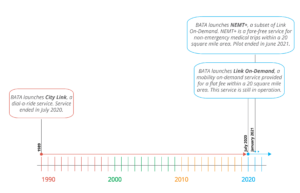
Timeline of transition from BATA’s City Link to Link On-Demand. Click on image for full view.
Credit: Shared-Use Mobility Center
Going into 2019, BATA staff had enough input from the community to determine that City Link needed an overhaul. BATA successfully applied for an Integrated Mobility Innovation (IMI) grant from the Federal Transit Administration, giving the agency the opportunity to pilot a new mobility on-demand program under the stipulation that they procure a new intelligent transportation system. In the process, BATA received an additional smaller grant from the Michigan Health Endowment Fund via the Grand Traverse Regional Community Foundation to implement an NEMT component for this pilot. After interviewing several vendors, BATA selected TransLoc to be its software provider for the soon-to-be Link On-Demand service. TransLoc’s ability to provide cloud-based, real-time data, its reputation as a well-established transportation technology, and its affordability factored in the agency’s procurement decision. (TransLoc charges BATA $500 per vehicle per month and gives the small agency the ability to simulate and process pre-analyzed data).
In August 2020, BATA launched the first part of Link On-Demand, giving anyone the ability to request real-time, point-to-point rides anywhere within a 20 square mile area around Traverse City for a flat fee. At the beginning of January 2021, Link On-Demand expanded its operations to include the NEMT+ pilot. Riders living within the same service area could also request rides, at no cost, to and from medical appointments at a set of 26 designated clinics, when using the NEMT+ service. While the Link On-Demand program consisted of two components—an MOD service and an NEMT service—passengers of both services rode on the same cutaway buses, making the program’s vehicle utilization more efficient. The pilot for NEMT+ ended on June 30, 2021 and the MOD pilot ended on July 31, 2021. BATA staff are now exploring how to continue Link On-Demand on a more permanent basis. As of now, Link On-Demand’s traditional MOD component will continue as a permanent service replacing City Link. NEMT+ has been discontinued.
Program Goals and Outcomes
Both Link On-Demand and its NEMT+ component were designed to address separate but overlapping problems: to make BATA’s point-to-point DRT service more efficient and customer-friendly and to provide a new mobility solution for customers in need of medical care.
BATA has seen the following outcomes since launching the Link On-Demand pilot:
- Only 3 or 4 vehicles are operating at a given time for Link On-Demand versus 5 or 6 City Link vehicles, saving costs for BATA while also improving the customer experience.
- No-show rates for requested rides have decreased from between 25 to 30% to under 3%.
- Average wait times of about 11 minutes after requesting a ride by phone, web portal, or app compared to the advertised time of 30 minutes.
- Increased ridership throughout the course of the COVID-19 pandemic. From August 2020 to the end of July 2021, Link On-Demand’s monthly ridership increased from about 1,700 monthly rides to about 3,500 monthly rides (NEMT+ included).
- More rides requested by app. In August 2020, about 70% of rides were requested by phone and 30% requested through the TransLoc app or online portal. In Spring 2021, around 60% of rides are requested by phone versus 40% by app or portal. On the NEMT+ service, about 85% of customers still make their requests by phone due to the service serving a larger proportion of elderly people.
- About 80% of all Link On-Demand trips served reduced-fare customers (ie. seniors, people with disabilities, youth, and current and former members of the military).
As seen, the new technologies in place have made Link On-Demand perform better than City Link, while more effectively addressing the needs of its customers.
Graph showing ridership on Link On-Demand (overall rides) and NEMT+. Credit: Shared-Use Mobility Center with data provided by BATA
Budget and Planning
BATA received two grants to fund the upstart costs of the Link On-Demand pilot. The larger of the two grants was through the Federal Transit Administration’s Integrated Mobility Innovation (IMI) program, which funds many mobility on-demand pilots across the United States. FTA’s grant amounted to $276,499 with MDOT providing additional funds of $69,125. [3] For the NEMT+ part of the pilot, BATA received an additional $50,000 from the Grand Traverse Regional Community Foundation and Michigan Health Endowment Fund. [4, 5]
Additional funding sources for Link On-Demand include fare payment and operational efficiencies. BATA has been able to operate Link On-Demand by giving more rides to customers in up to four vehicles instead of using six vehicles with City Link. While the savings in dollars is not yet available, BATA estimates that Link On-Demand has saved the agency about 15% from the $435,000 annual cost for City Link.
Program Operations
Link On-Demand is designed to integrate the conveniences of on-demand services into the elements of a pre-existing dial-a-ride system. Like the previous City Link service, the Link On-Demand MOD program operates on the same hours: 6 AM to 10:30 PM during the work week and 6 AM to 11:30 PM on the weekends. NEMT+ operated only during the same work week hours as the MOD service. Rides on both pilots took place on the same cutaway buses as City Link. Customers can request rides up to one day ahead of time but are encouraged to do so in real-time. Rides can be requested by phone, via an online portal or with the TransLoc app. BATA states that wait times for a real-time request are thirty minutes or less. Link On-Demand drivers are directed to pick-ups and drop-offs through an on-board tablet computer.
On the traditional MOD service, a full one-way fare is $6, with a $3 reduced fare available for students, seniors, people with disabilities, veterans, and active members of the military. This fare structure mirrors that of BATA City Link. With the NEMT+ service, rides to or from medical appointments at 26 partner clinics were fare-free for the duration of the respective pilot. Fares can be paid through HopThru, BATA’s mobile ticketing app, in cash, or through a pre-paid ticket. The entire Link On-Demand pilot ran from August 1, 2020 to July 31, 2021, with the NEMT+ sub-pilot having begun and ended on January 1, 2021 and June 30, 2021 respectively. [6]
Marketing
The COVID-19 pandemic affected BATA’s ability to market Link On-Demands’ MOD and NEMT+ services in-person. Nonetheless, BATA used its resources from other places to inform Traverse City-area residents about the pilots. BATA staff held one virtual town hall meeting in the summer of 2020. Leading into the MOD component that began in August 2020, BATA mailed postcards to all customers who used the City Link service within the previous year. BATA bus operators also directly informed their customers about the new service through word-of-mouth marketing and BATA did a large media push by distributing a press release, e-mails, texts, and social media posts. For the NEMT+ pilot that began in January 2021, BATA mailed another round of postcards to previous Link customers. Partner clinics received materials to distribute to their patients in their lobbies, while TransLoc provided BATA with a variety of templates they could use to educate their customers about using the app to request rides.
Universal Access
As a DRT service, Link On-Demand is tailored to seniors and people with disabilities. All Link On-Demand vehicles are wheelchair-accessible cutaway buses equipped with mobile lifts. Staff at BATA have determined that on the NEMT+ service specifically, 22% of riders used wheelchairs. The fare structures on both the Link On-Demand MOD and NEMT+ services have also been inviting to people with disabilities and seniors. Rides on NEMT+ were fare-free for all customers and on the MOD service, seniors and people with disabilities qualify for a reduced fare of $3 for a one-way trip—half the cost of standard fares.
Challenges and Lessons Learned
Link On-Demand has made life easier for BATA customers and staff. No-show rates have decreased to under 3%, wait times average at about 11 minutes, and program ridership has steadily increased. With the use of TransLoc’s software to administer Link On-Demand, BATA has made its DRT service more flexible and data-driven. While the Link On-Demand pilot has run smoothly, the COVID-19 pandemic has presented BATA with its challenges. As with most transit agencies across the United States, ridership across BATA’s system has decreased. BATA had to postpone the beginning of the pilot originally, bus drivers have been tasked with enforcing mask mandates, sometimes creating tensions with customers, and staff had to learn a new technology.
Through the successes of the Link On-Demand pilot, BATA staff has realized that they can do more with less. In other words, the technology-driven approach the agency has adopted in partnership with TransLoc has enabled Link On-Demand to serve more customers more efficiently while also decreasing the number of buses/drivers operating at a given-time. Link On-Demand has also generated significant cost savings compared to City Link. The agency expects that Link On-Demand will cost the agency about $370,000 in its first year, a 15% savings from the City Link cost of $435,000.
Future Plans
Link On-Demand is a successful pilot and BATA looks forward to continuing its partnership with TransLoc. With the pilot phase concluding, BATA wants to see the Link On-Demand program grow into the more rural areas of Grand Traverse and Leelanau counties and potentially replace some of its lower-performing fixed-bus routes in the urban core of its service area. BATA is reviewing transit simulations from TransLoc in order to make these determinations. Either Link On-Demand will have one large service area as it does now or have certain smaller zones that its buses are limited to move through. Since the grant from the Grand Traverse Regional Community Foundation has expired outside of the pilot, fare-free rides are no longer available on the NEMT+ service. BATA sought to have medical clinics pay for their patients’ fares for their rides to and from their appointments and determined that such a model is not viable. Link On-Demand’s MOD service will continue to operate without the NEMT+ component. In place of NEMT+, BATA will pursue other sustainable strategies for medical clinics by offering bulk ticket purchase and non-binding contractual options.
Conclusion
As BATA moves the Link On-Demand pilot into a more permanent service, it is important to note that Link On-Demand is not a new, but transformed service for Traverse City. City Link had its clear place in BATA’s broader transit system, giving people point-to-point rides to important destinations. Link On-Demand continues to deliver these important services—using the same buses, same drivers, and same service area—but with increased efficiency for the agency and reliability for its customers.
Like dial-a-ride and microtransit services across the United States, Link On-Demand is a tool to transport people not always well-served by fixed-route transit. At the same time, BATA took advantage of important grants and new technologies to design Link On-Demand into a service that works well for Traverse City. US transit agencies have experienced significant challenges recently with decreased ridership exacerbated by the COVID-19 pandemic. While fixed-route buses remain the primary staple in BATA’s system, BATA realized that in order for its transit system to best serve its customers, that its dial-a-ride system must adapt, not go away.
2025 Update
BATA has continued the Link On-Demand (renamed to Link in 2023) beyond its IMI award, transitioning it from a demonstration into a permanent system-wide service. Rather than scaling back service at the end of the IMI demonstration, BATA was able to sustain and expand Link with funding from a mix of federal, state, and local sources, including property tax revenue and FTA formula funds. This decision was informed by the demonstration’s strong ridership as well as BATA’s assessment from the demonstration that on-demand transit had become a core part of the region’s transportation network.
Service Area Expansion
As a permanent service, Link expanded its service area to reach more rural regions of Grand Traverse and Leelanau counties. Operating in a large region with mixed urban and rural geographies comes with its own set of challenges; during the demonstration, BATA operated microtransit and paratransit simultaneously under Link On-Demand, putting an occasional strain on the operational ability to fulfill rides on busy days. Even with this strain, Link On-Demand has performed strongly by fulfilling about 80% of ride requests while often operating at capacity. Demand for this service has remained consistently high, especially with the service expansion into low-density areas. While operating in these areas can increase travel times and lower the number of rides Link On-Demand was able to fulfill, BATA viewed this expansion as an essential part of the agency’s role in the community. For many riders in these areas, popular destinations included work-related travel, medical appointments, and services that would be difficult to reach without a car.
Partnership Changes
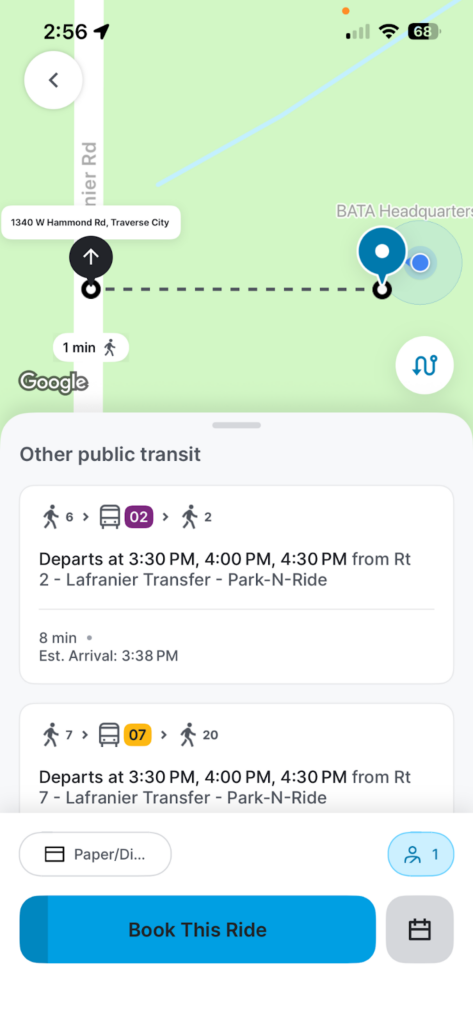
Screenshot of the Link mobile app demonstrating the Mode Preference feature in action. Credit: BATA
Link’s expansion into more rural parts of Grand Traverse and Leelanau counties was accompanied by a partnership transition. BATA worked with TransLoc as the technology provider for the duration of the Link On-Demand pilot project under the IMI demonstration. The agency has since partnered with Via to handle Link’s microtransit operations technology. Via’s software offers a number of features that BATA has implemented to improve both Link and BATA’s wider service in Traverse City, one of which is Mode Preference, which works to prevent duplicative services. With the Mode Preference feature, the user-facing mobile app can prioritize fixed-route options based on parameters set by BATA. For example, if a user requests a Link ride that can be adequately served by a fixed-route bus, the mobile app will deny the ride and will instead display fixed-route transit directions to the user’s destination. BATA has control over how the app determines whether a trip can be fulfilled with fixed-route service, and sets figures for travel time, proximity to a bus stop, and the number of transfers. Currently, requested trips with origin and destination points within 200 yards of a bus stop that would not require any fixed-route transfers, and would arrive within 30 minutes of the originally requested Link trip, are deferred to fixed-route directions. This feature prevents microtransit from directly taking rides that could otherwise be served by fixed-route services – a common concern about microtransit – while ensuring that vehicles are more available to fulfil microtransit rides and helping with cost efficiency, since microtransit generally carries a higher cost per passenger mile than fixed-route transit.
Link Airport Pilot
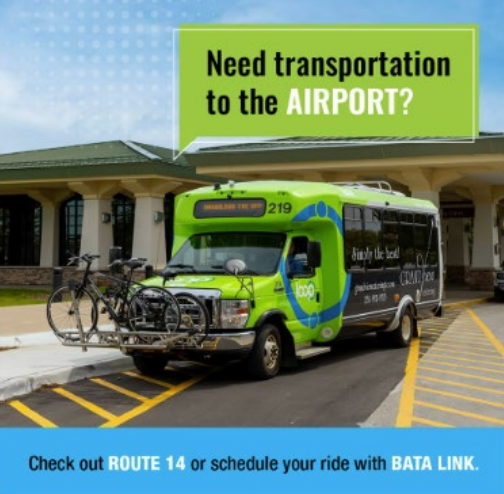
Marketing materials from the BATA Link airport pilot. Credit: BATA
BATA continues to explore how Link can address other transportation barriers in the region. Cherry Capital Airport (TVC) in Traverse City is Michigan’s third busiest airport by passenger volume, and is a key destination for regional mobility. Many flight departures and arrivals at TVC are scheduled in the early morning or late at night, outside of BATA’s fixed-route operation hours, and at times with limited rideshare or taxi options. Recognizing the critical transportation needs, BATA launched an early morning Link service pilot to and from TVC from March 2025 to September 2025. The on-demand pilot was designed to be an early morning complementary service to the existing Village Route 14 fixed-route bus, which operates from 6:45 am to roughly 7:45 pm on weekdays. The pilot was successful in completing 77% of rides requested, with no passengers missing their flight. However, during this pilot, BATA faced driver shortages, and could not offer weekend service or evening rides. Passengers noted that this service would have been more useful to them if it had expanded hours and could complete rides outside of Traverse City itself. While the TVC pilot only lasted seven months, it offered valuable insights to BATA about travel patterns in the region. Further, the pilot also offered insight into the broader mobility network and the need for more on-demand options, including rideshares or taxis, that operate outside of BATA’s operating hours.
Payment Integration Coalition
In late 2025, BATA became a NEORide member. NEORide is a national council of governments and transit agency collaboration network that is focused on advancing integrated mobility solutions among small and mid-sized transit systems. This consortium of transit agencies shares resources and expertise, as well as technology, to improve service delivery and expand transit offerings in an effort to strengthen cooperation among transit providers through joint procurements, shared technology platforms, and coordinated planning that individuals might struggle to implement on their own. For BATA, joining NEORide was a strategic decision to learn from and add to this pool of transit innovation and shared solutions.
One of NEORide’s technology platforms, EZfare, is a regional account-based mobile fare payment and ticketing system used by 19 transit agencies that are already NEORide members. While BATA has not yet fully integrated EZfare into Link, its membership ensures that future systems will be set up for fare integration and cross-system payment solutions that could simplify how riders pay for trips across different modes and agencies. Using a fare framework like EZfare can make multi-leg and multi-modal journeys simpler for passengers by removing the need for multiple apps and payment methods.
Conclusion
Now, as a permanent transportation option, Link’s story illustrates BATA’s ability to apply innovative technologies to improve mobility, adapt to partnership changes, and be flexible in service planning and delivery to align with critical community needs. BATA recognized the impacts of this flexible, on-demand transportation option in Grand Traverse and Leelanau Counties, and worked to continue the service past the IMI demonstration period. Link demonstrates how FTA investments partnered with community-centered planning and transit agency dedication can fill transportation gaps and provide innovative and long-lasting transportation options.
References
- Shared-Use Mobility Center: “Learning Module: Rural and Small Town Transportation”, published July 31, 2019. https://learn.sharedusemobilitycenter.org/learning_module/rural-and-small-town-transportation/.
- US Census Bureau: American Community Survey 1-year estimates for 2019. https://censusreporter.org/profiles/31000US45900-traverse-city-mi-micro-area/. Accessed July 28, 2021.
- Federal Transit Administration: “CHARTS: Comprehensive Healthcare Access with Rural Transit Solutions, Traverse City, MI”. https://learn.sharedusemobilitycenter.org/wp-content/uploads/FTA-IMI-CHARTS-Link-Description.pdf. Accessed July 28, 2021.
- Grand Traverse Regional Community Foundation: “Community Foundation Partners with BATA on Fare-Free Medical Transport Pilot”. https://www.gtrcf.org/news/news-articles/community-foundation-partners-with-bata-on-fare-free-medical-transport-pilot.html. Accessed July 28, 2021.
- Michigan Health Endowment Fund: “From Here to There: Health-Related Transportation Grants and Lessons Since 2014”, published March 2020. https://mihealthfund.org/wp-content/uploads/2020/04/HealthFund_FromHereToThereTransportationReport.pdf.
- Bay Area Transportation Authority: “Link On-Demand”. https://www.bata.net/maps-schedules/link-on-demand/link-on-demand.html. Accessed July 28, 2021.
